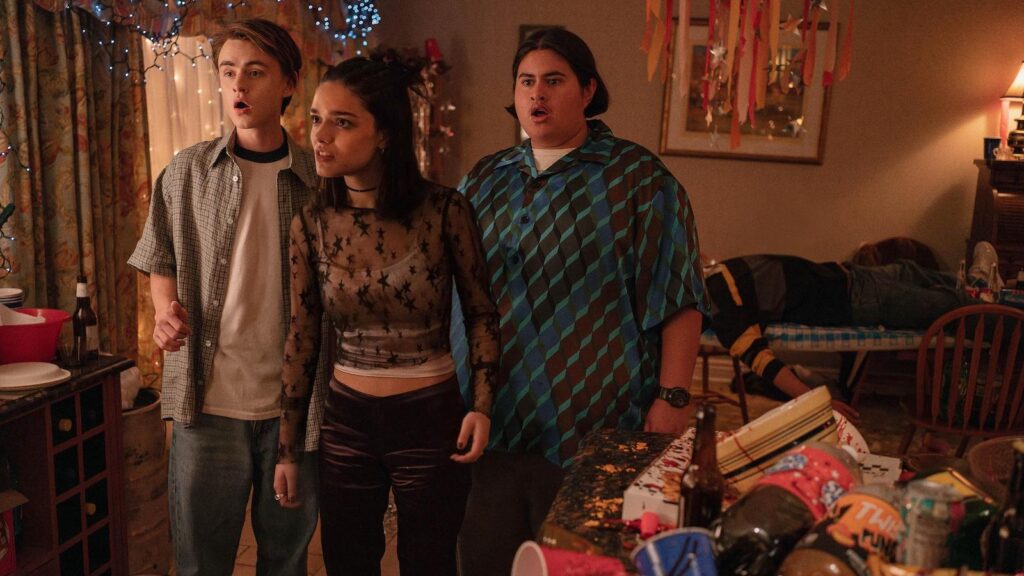
Being unpopular in high school can feel like the end of the world. Your parents are embarrassing. Your best friend is a loser. The cool kids either bully you or ignore you. The girl you have a crush on barely knows you exist. And sentient computers have hatched a conspiracy to enslave the human race.
That the last of these items feels concordant with its predecessors is the central joke of Y2K, Kyle Mooney’s occasionally inspired, ultimately tedious new horror comedy. For Eli (Jaeden Martell, one of those anodyne actors who seems destined to play teenagers into his 30s), every day feels like its own miniature apocalypse—a perpetual ritual of awkwardness and humiliation. That’s an exaggeration, of course; his parents (Alicia Silverstone and Tim Heidecker) are sweet and supportive (how mortifying!), and he has plenty of fun playing videogames and goofing around with his closest pal, Danny (a solid Julian Dennison). But Eli still feels anxious and unfulfilled, especially because Laura (Rachel Zegler), the hot brainiac whom he sweatily flirts with online, seems more interested in older, more muscular dudes. So when his humdrum Friday night turns into a chaotic free-for-all full of death and dismemberment, he’s more than ready to save the day and get the girl.
As befits a nostalgia piece, Y2K borrows liberally from a number of classics, including Superbad and The Terminator. But the movie it most evokes is Shaun of the Dead, the zombie comedy in which a pair of listless nobodies become saviors in their community’s sudden fight against an army of shuffling corpses. The crucial difference is that, whereas Edgar Wright is a filmmaker of considerable panache, Mooney is, well, a comedian making his first feature. Conceptually speaking, Y2K is intriguing, interrogating the conventions of the high-school comedy while also straddling tones and hopping across genres. But as a matter of execution, it’s awfully stale, with a spotty joke quotient and feeble set pieces.
It does, however, exhibit a firm grasp of its milieu. We have reached the age where a movie set in the late ’90s can be classified as a period piece, and Mooney stocks the picture with the aural and visual touchstones of that bygone era: janky CD players, crisscrossing AOL conversations, that inimitable beep-beep-beeping of a dial-up internet connection. As someone who was also a high school junior at the end of the last millennium, I confess to recoiling in horrific recognition upon watching Eli frantically type and then delete strings of text in his instant-message window, hoping against hope that he might win Laura’s heart with just the right lowercase witticism.
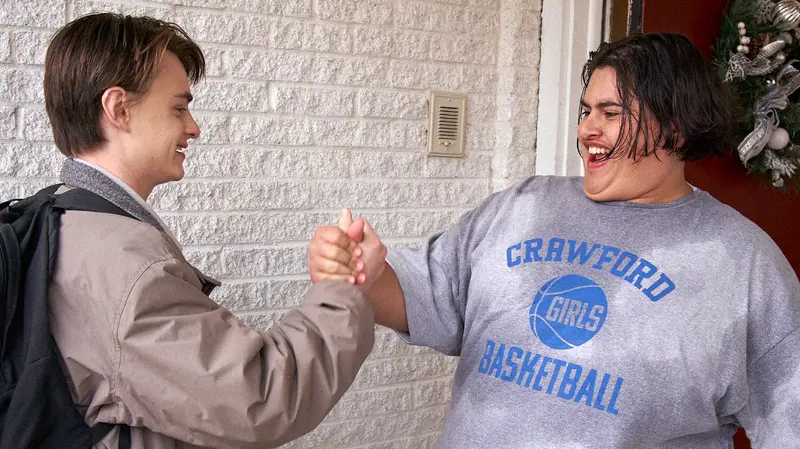
Yet despite Zegler’s appealing presence, Laura is a mere type: the attractive popular girl who is the implausible object of our dorky hero’s affections. Instead, the more dimensional relationship in Y2K is that between Eli and Danny. They’re very tight—they call each other “the Sticky Brothers,” and Danny’s mom refers to Eli as “my other son”—but their friendship isn’t exactly perfect or symmetrical. Loutish and heavyset, Danny would seem to scan as the loyal best bud—the Robin to Eli’s Batman (or, to borrow from Dennison’s superhero filmography, the Cable to Eli’s Deadpool). But Dennison, who showcased some chops in Hunt for the Wilderpeople, plays Danny as confident and decisive, which contrasts sharply against Eli’s standard-issue diffidence. The result is a curious tension that underlies the usual boys’-club tomfoolery.
Mooney might have been better served to excavate that tension, but he has a different agenda. Psyching themselves up with bluster and alcohol (the latter retrieved by breaking the lock on a liquor cabinet), Eli and Danny decide to attend a party that Laura told them about, even if they weren’t strictly invited. (In an amusing runner, Eli refers to the host as “Soccer Chris.”) This allows Mooney to conduct a brief anthropological survey of turn-of-the-century teendom, as when the camera wanders among the various congregants, the soundtrack toggling artists to match the clique. (Sampled musicians include Fatboy Slim, Mandy Moore, and Korn, while Chumbawamba’s “Tubthumping” becomes the movie’s leitmotif.) The high point is Danny’s spirited rendition of Sisqó’s “Thong Song,” a boisterous display of self-possessed gyrating that turns this ostensible nimrod into a temporary stud.
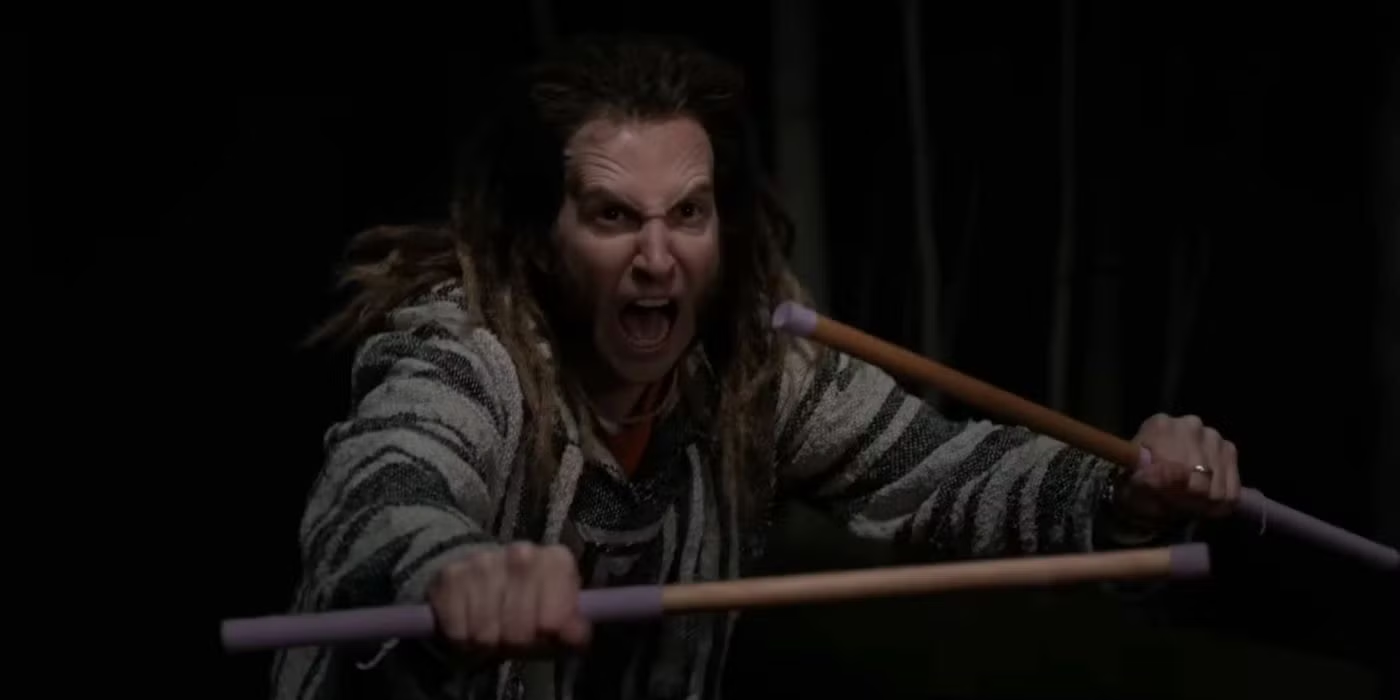
Not for long though. As you can probably glean from the title, it’s New Year’s Eve 1999, and when the clock strikes midnight, the millennium bug activates with a vengeance, turning all electronic appliances into killing machines. Mooney’s array of implacable gizmos is vast—the instruments of death include dishwashers, microwaves, and VCRs—but aside from a remote-control car fatally wielding a can of hairspray, he doesn’t stage his technological bedlam with much visual imagination.
That’s a problem, because the majority of Y2K is an ungainly hybrid of apocalyptic terror and absurdist comedy. You’d think an actor of Mooney’s pedigree could locate a steady comic rhythm in this combination (he co-wrote the screenplay with Evan Winter), but most of the dialogue here is flat and stiff. For example, he casts himself as Garrett, a stoner video-store clerk with a laissez-faire attitude; it seems like a clever conceit, but nothing Garrett says or does is especially funny. That’s true of the other secondary characters as well, like a pair of burnouts (Daniel Zolghadri and Lachlan Watson) whose vitriol lacks oomph, or a C-list celebrity whose identity I can’t reveal but who’s asked to shoulder far greater narrative weight than the gag can possibly support.
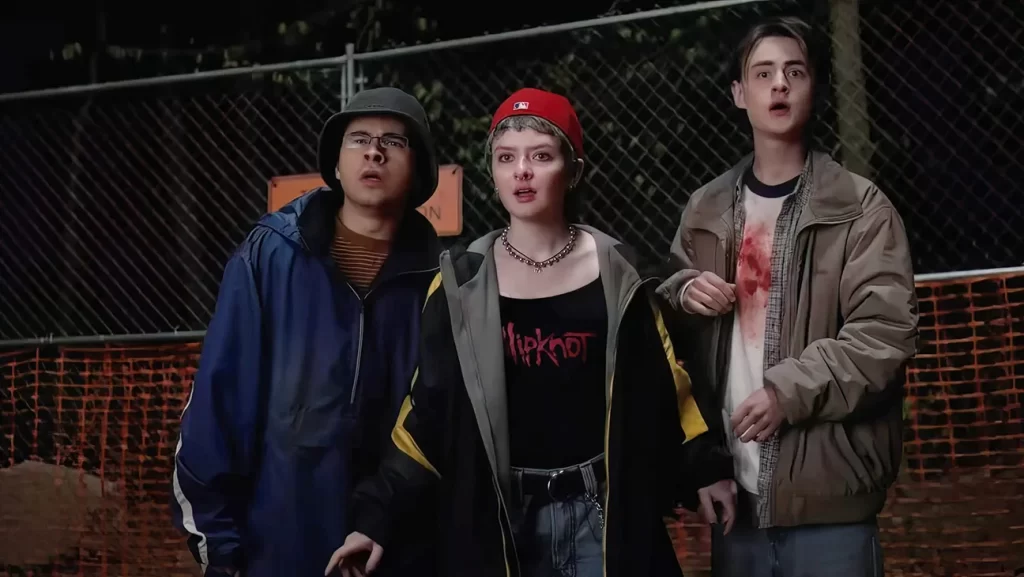
That leaves the mayhem, which does clock in according to expectations in that it’s largely terrible. I can hardly ask Kyle Mooney to operate with the same level of flair as James Cameron, but it would be nice if he exhibited some degree of aesthetic style. Instead we just get dull and jumbled sequences, like a giant amalgamated robot lumbering toward its prey or a porta-potty rolling down a hill. The movie’s most innovative thought is the novel deployment of a condom during its climax, which doesn’t speak well for the remainder of the clattering chaos.
There are worse cinematic sins than failing to follow through on an interesting concept. Still, Y2K leaves a vaguely sour aftertaste of squandered potential, as though a programmer came up with a great idea for a new product but then forgot to input the code. The outline here may be promising, but the execution is buggy.
Grade: C+
Jeremy Beck is the editor-in-chief of MovieManifesto. He watches more movies and television than he probably should.
